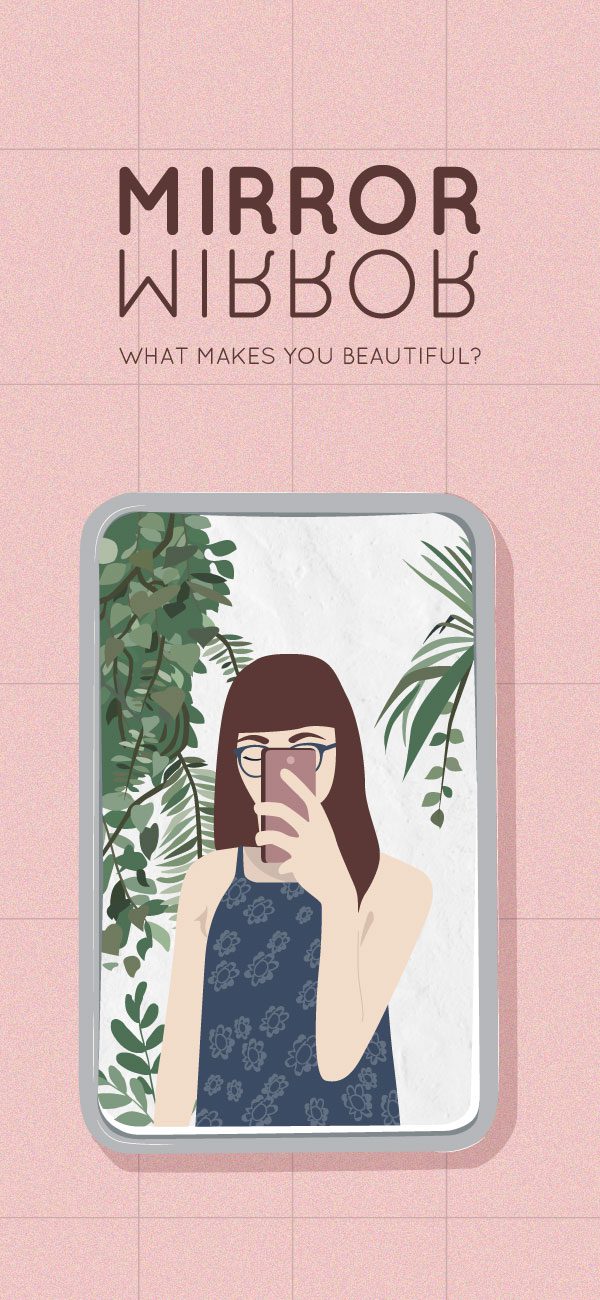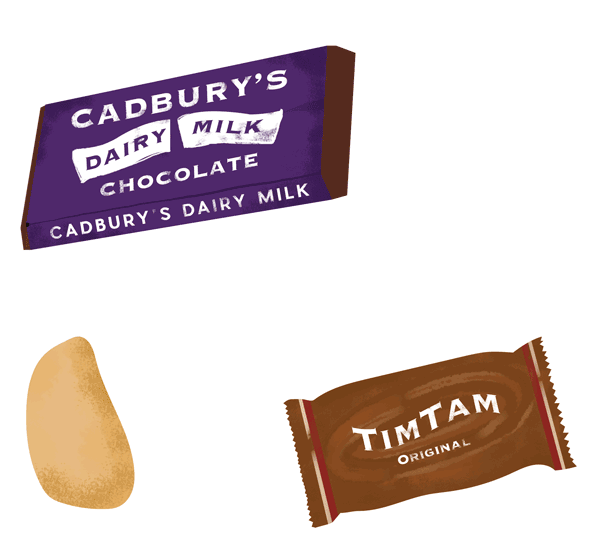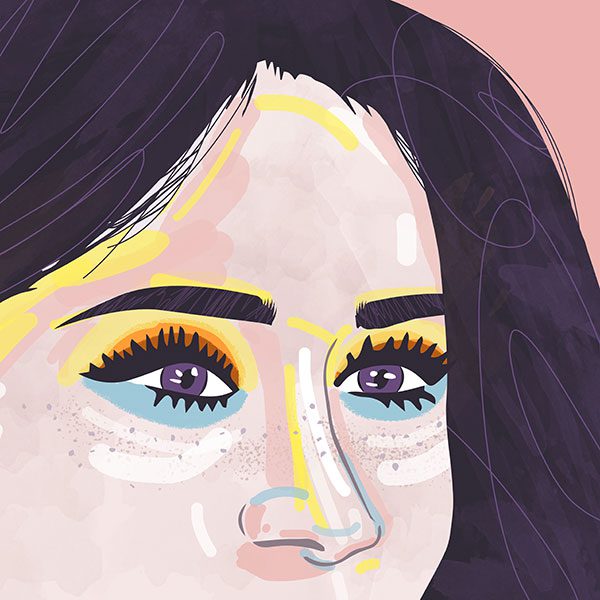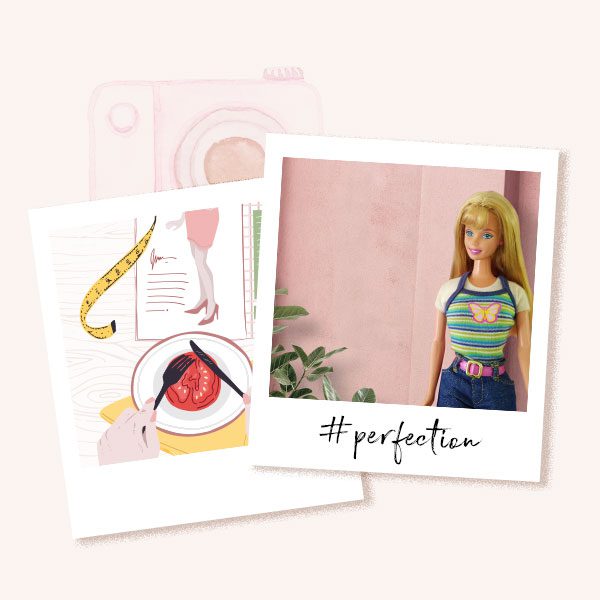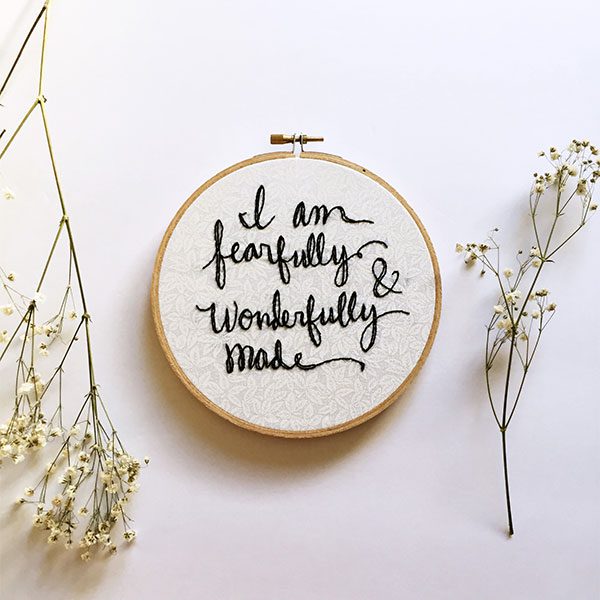Mirror Mirror: What Makes You Beautiful?
Written by Deborah Fox
Layout and Design by Vania Tan & Meliana Sari Dewi
Front cover illustration based on photo by @cestweina
Hannah came home from school crying. She was being bullied online and in person by some of her classmates. They called her names and shamed her for being anorexic. In fact, Hannah suffered from an illness that made it almost impossible for her to put on weight. No matter what she ate—chocolate bars, chips, hamburgers, even a whole packet of Tim Tams—she just stayed thin.
Hannah was trying so hard to put on weight to fit the mould of what she was told was “beautiful”, that she became used to consuming a large quantity of food. Then, when she hit her mid-twenties, her metabolism started to change. Within the space of two years, she went from a size 6 to a size 22.
Now, Hannah was told she was fat. Now, she faced pressure to change herself again. She began dieting and exercising rigorously, and was back to a “beautiful” size 10 within a year. “Finally,” Hannah thought, “I’ve made it! Now I can be accepted and get on with my life.”
Eventually, Hannah found a welcoming group of friends who accepted her for who she was. But Hannah’s inner struggle continued. No matter what she did, she never felt like she was “good enough”. Would she ever be attractive enough to find a husband? The other girls around her always seemed to be prettier and more popular.
Does Hannah’s experience sound familiar to you? Do you feel that you have to change who you are, just to be happy? Have you been teased about your size, your appearance, or the clothes you wear? Do you wonder if there is more to life than trying to force yourself into the ideal of “beautiful” to feel loved and accepted by others?
The pursuit of beauty:
HOW DO OTHERS SEE YOU?
When I dated my first boyfriend, I tried to keep thin and never left the house without a full face of make-up. After we broke up, he said he actually preferred me when I was a bit heavier and with a “naked” face without any foundation, mascara, or lipstick. I was shocked that we could have different ideals of beauty.
The Collins Dictionary defines beauty as “the combination of all the qualities of a person or thing that delight the senses and please the mind.” Yet much of social media and many magazines and TV shows focus on the skin-deep aspect of beauty. By highlighting physical beauty, they create standards that are beyond most women.
From a young age, we are conditioned to believe that our plastic dolls are the epitome of perfection however unattainable their proportions may be.
As a result, many of us develop the idea that we need to look a certain way to please others, or to be accepted by them. It puts pressure on us to fit in with the crowd. Worse still, it affects what we think of ourselves.
When I started high school, I heard other girls in the change rooms talk about the “problem areas” they wanted to fix. I started thinking that I may not be “good enough” either. Around the same time, my mum also began dieting with Weight Watchers. The daily compliments she received from her weight loss impacted my own desire to lose weight. She tried to discourage me from dieting but I quickly became obsessed with staying below a magical number to be “thin enough”. I exercised obsessively, limited my calorie intake, and weighed myself each day.
Then, almost as if overnight, my body swelled up. I had no idea that my puffy face and bloating were due to a gluten intolerance. Until I received a diagnosis and was able to change my diet, all I saw in the mirror was a fat, lonely girl desperate to feel loved and accepted.
From a young age, we are conditioned to believe that our plastic dolls are the epitome of perfection however unattainable their proportions may be.
As a result, many of us develop the idea that we need to look a certain way to please others, or to be accepted by them. It puts pressure on us to fit in with the crowd. Worse still, it affects what we think of ourselves.
When I started high school, I heard other girls in the change rooms talk about the “problem areas” they wanted to fix. I started thinking that I may not be “good enough” either. Around the same time, my mum also began dieting with Weight Watchers. The daily compliments she received from her weight loss impacted my own desire to lose weight. She tried to discourage me from dieting but I quickly became obsessed with staying below a magical number to be “thin enough”. I exercised obsessively, limited my calorie intake, and weighed myself each day.
Then, almost as if overnight, my body swelled up. I had no idea that my puffy face and bloating were due to a gluten intolerance. Until I received a diagnosis and was able to change my diet, all I saw in the mirror was a fat, lonely girl desperate to feel loved and accepted.
The passion of beauty:
HOW DO YOU SEE YOURSELF?
When you look in the mirror, how do you feel about your reflection?
In a recent study that posed this question to thousands of women around the world, only 20 per cent of Aussie women said they were happy with their looks. Almost 90 per cent said they would consider cancelling their plans to leave the home for an appointment based simply on their appearance. It seems ironic that the very thing we are attempting to attain—the admiration and respect of others—is something we shy away from when we feel like we’re not “good enough”.
This pursuit of physical perfection can seep into the way we carry out our work, studies, sports, and even hobbies we are supposed to enjoy. When we try to gain the approval of others based on our outward appearance, it never seems to be enough. As a result, it can lead to depression, fear of rejection, online bullying, and obsessive dieting. What lies at the core of these insecurities? What are we trying to measure up to?
The problem with beauty:
A TRUE REFLECTION
In the fairy tale of Snow White and the seven dwarfs, the evil queen pursues physical perfection. She constantly asks her enchanted mirror, “Who is the fairest of them all?” For years, she is told that she is indeed the fairest.
But one day, the mirror reveals a new answer: her step-daughter Snow White. Consumed with envy, the evil queen is forced to face the fact that her physical beauty is only temporary. She may have once been the most attractive woman in the land, but beauty, as the world defines it, is not something that lasts forever.
In addition to its temporal nature, physical beauty is also subjective. In some cultures, a fuller figure is more desirable than a leaner one. Even within Australia, post-Second World War advertising posters promoted Wate On—a drug that allowed skinny women to “fill out” because the beauty standard of that time was a fuller figure.
The posters asserted that “If you want to be popular, you can’t afford to be skinny.” If you can’t afford to be fat, and you can’t afford to be skinny, what can you afford to be?
Perhaps our concept of physical beauty could be skewed because our understanding of beauty itself is flawed. Physical beauty—the shallow, skin-deep type—only captures a fraction of what makes you . . . you. It doesn’t reflect the qualities that make you unique or the things that are of real importance like your character or personality, your skills and interests, or the way you care for those around you. Being liked for how you look cannot bring you lasting joy.
Your true value is not found in how you look. It is not found in the clique you belong to, the number of followers you have on Instagram, or the size of your jeans. The truth is, you were made for something more. Much more.
The pursuit of true beauty:
A NEW PERSPECTIVE
Hannah still struggles with body image issues. I do too, but my perspective changed once I realised that my appearance mattered in a different way. In the Bible, Psalm 139:13-14a assures me that I am uniquely beautiful to God because He created me with purpose:
For you created my inmost being; you knit me together in my mother’s womb. I praise you because I am fearfully and wonderfully made.
You will never be perfect to others . . . but that’s okay. It’s okay because you are beautiful to one person: the one who created you.
You are beautiful in God’s eyes because you were made in His image. He knows every freckle on your face and every strand of hair on your head. He loves you and He has created you for a purpose. And He is waiting to lead you on a journey to know true beauty and understand how precious you are in His sight.
Embroidery and photo by
Elizabeth Mattson
When Jesus Christ came to earth, He was more interested in those who were rejected by society than He was in those who were popular or admired for their looks. What society rejected, Jesus saw as beautiful, because He had made them. And because He loved those He made, He was willing to sacrifice Himself for them.
If you search for the beauty that the world desires and offers, it will leave you feeling inadequate and insecure. But when you discover the love of God shown through Jesus Christ, you will gain a new perspective of your true beauty and value as His special creation. It will set you on the path of freedom to be who you are, not what is expected of you.
Physical beauty is not a bad thing in itself. But when I came to understand the depth of God’s goodness, love, and grace for me, I began to see the meaning of beauty in a whole new light. I sometimes feel pressure to change how I look in order for people to like me. But I know that I don’t need to change in order to please God because He loves me just as I am.
Would you like to learn more about this God who knows you and loves you—just as you are? How about pick up a Bible and take a look at what it says about who God is and who you are in His sight? We also encourage you to contact a Christian friend or a nearby church to speak to someone who can tell you more.
You can also click on the banner below to learn more about God and to read the many resources we have to help you.

